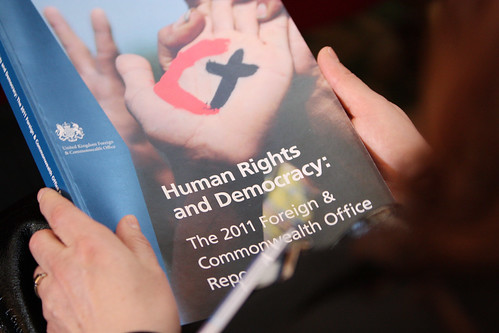2nd July 2012
Freedom of Religion: what we are doing to protect it

In the joint communiqué signed between the British Government and the Holy See in February this year, both sides committed to “working together to combat intolerance and discrimination based on religion, wherever it is manifest”. This was a significant promise. What does it mean in practice?
In essence, it means working together multilaterally and internationally to ensure freedom of religion or belief. The European Union took an important step in this direction on 25 June, with the adoption by the Foreign Affairs Council of a new EU Human Rights Strategy. This has been supported and welcomed by the United Kingdom. The Foreign Secretary, William Hague, has said that human rights should be at the forefront of the EU’s external engagement, despite the current dominance of economic issues on the international agenda. Especially welcome in the new strategy is a strong focus on freedom of religion, particularly in the context of human rights violations and sectarian-style attacks in many parts of the world. There is more than enough for the EU to do. But the commitment is clearly there and should be welcomed by the Holy See.
The 2011 Foreign and Commonwealth Office Report on Human Rights and Democracy, launched on 30 April by Mr Hague, notes that: “Protecting religious freedoms and preventing discrimination on grounds of religion or belief are priority human rights issues for the UK Government”, and that: “Freedom of religion and respect for religious plurality is at the core of British society”. Our Embassies and High Commissions around the world are tasked to raise concerns about religious freedom with host governments whenever issues arise, and to take action on cases of persecution or discrimination. We monitor carefully the performance of key countries of concern. For example, in the wake of the Arab Spring, Lord Howell told the House of Lords last December during a debate on Christians in the Middle East that the UK Government believes that the treatment of religious minorities will be a valuable litmus test of whether we are watching a truly democratic process unfolding in the region.
The UK Government has engaged with many governments around the world over the last year on this key issue, including Kazakhstan, Turkey, Indonesia, Nigeria and Pakistan. That engagement has often led to real improvements on the ground. We have also worked in the UN, often in partnership with the EU, to improve UN performance on this issue. The Foreign Office is strengthening its engagement with leaders of different faiths in the UK, and our own internal understanding of what is a complex and sensitive set of issues. We look forward to continuing to work closely with the Holy See in an area of work that remains a key test of the health of any pluralistic democracy.